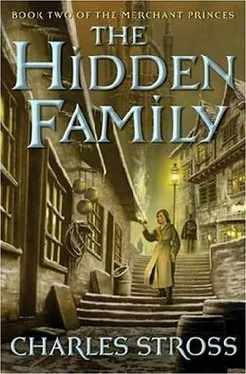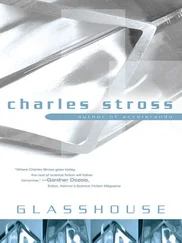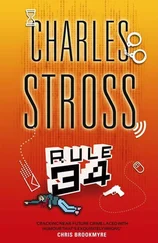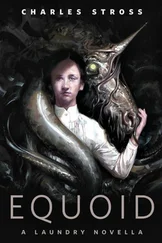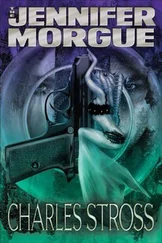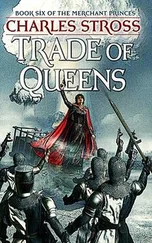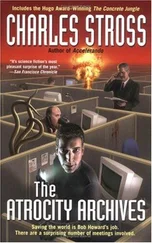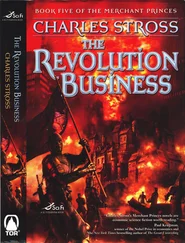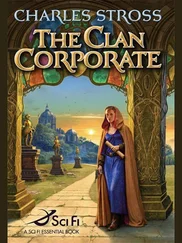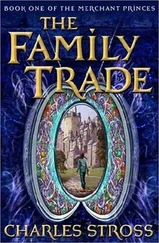“Well now,” breathed Burgeson, “if this is what ladies of means pay their bills with in Scotland, maybe it’s not such an unbelievable fiction after all.”
Miriam nodded. It had better cover the bills, she thought, the damn thing set me back nearly three thousand dollars. “It all depends how honest you aren’t,” she said briskly. “There are more where this one comes from. I’m looking to buy several things, including but not limited to money. I need to fit in. I don’t care if you’re fiddling your taxes or lying to the government, all I care about is whether you’re honest with your customers. You don’t know me, and if you don’t want to, you’ll never see me again. On the other hand, if you say ‘yes’—” she met his eyes—”this need not be our last transaction. Not by a very long way.”
“Hmm.” Burgeson stared right back at her. “Are you in French employ?” he asked.
“Huh?”
Miriam’s fleeting look of puzzlement seemed to reassure him. “Well that’s good,” he said genially. “Excuse me while I fetch the aqua regia: If this is pure I can advance you, oh, ten pounds immediately and another, ahum—” He picked up the gold bar and placed it on the balance behind him. “—sixty two and eight shillings by noon tomorrow.”
“I don’t think so.” Miriam shook her head. “I’ll take ten today, and sixty tomorrow—plus five full pounds’ credit in your shop, here and now, for goods you hold.” She’d been eyeing the price tags. The shilling, a twentieth of a pound, seemed to occupy the same role as the dollar back home, except that they went further. Pounds were big currency.
“Ridiculous.” He stared at her. “Three pounds.”
“Four.”
“Done,” he said, unnervingly rapidly. Miriam had a feeling that she’d been had, somehow, but nodded. He strode over to the door and flipped the sign in the window pane to CLOSED. “Now by all means, let me test out this bar. I’ll just take a sample with this scalpel, mind. ..” He hurried into the back room. A minute later he re-emerged, bearing a glass measuring cylinder full of water into which he dropped the gold bar. Scribbled measurements followed. Finally he nodded. “Oh, most satisfying,” he muttered to himself before looking at her. “Your sample is indeed of acceptable purity,” he said, looking almost surprised. Reaching into an inner pocket he produced a battered wallet, from which he plucked improbably large banknotes. “Nine one-pound notes, milady, the balance in silver and a few coppers. I hope these are to your satisfaction; the bank across the street will happily exchange them, I assure you.” Next he produced a fountain pen and a ledger, and a wax brick and a candle and a metal die. “I shall just make out this promissory note for sixty pounds to you. If you would like to select from my wares, I can work while you equip yourself.”
“Do you have a measuring tape?” she asked.
“Indeed.” He pulled one down from a hook behind the counter. “If you need any alterations making, Missus Borisovitch across the way is a most excellent seamstress, works while you wait. And her daughter is a fine milliner, too.”
Over the next hour, Miriam ransacked the pawnbroker’s shop. The range of clothing hanging in mothballs from rails all the way up to the ceiling, a dizzying twenty feet up, was huge and strange, but she knew what she wanted—anything that wouldn’t look too alien while she realized her liquid assets and found a real dressmaker to equip her for the sort of business she intended to conduct. Which would almost certainly require formal business wear, as high finance and legal work usually did back home. For a miracle, Miriam discovered a matching jacket, blouse, and long skirt that was in good condition and close enough to her size to fit. She changed in Burgeson’s cramped, damp-smelling cellar while he reopened the shop. It took some getting used to the outfit—the jacket was severely tailored, and the blouse had a high stiff collar—but in his dusty mirror she saw someone not unlike the women she’d passed on her way into town.
“Ah.” Burgeson nodded to her. “That is a good choice. It will, however, cost you one pound fourteen and sixpence.”
“Sure.” Miriam nodded. “Next, I want a history book.”
“A history book.” He looked at her oddly. “Any particular title?”
She smiled thinly. “One covering the past three hundred years, in detail.”
“Hmm.” Burgeson ducked back into the back of the shop. While he was gone, Miriam located a pair of kidskin gloves and a good topcoat. The hats all looked grotesque to her eye, but in the end she settled on something broad-brimmed and floppy, with not too much fur. He returned and dumped a hardbound volume on the glass display case. “You could do worse than start with this. Alfred’s Annals of the New British. ”
“I could.” She stared at it. “Anything else?”
“Or.” He pulled another book up—bound in brown paper, utterly anonymous, thinner and lighter. “This.” He turned it to face her, open at the fly-leaf.
“The Hanoverian Exodus Reconsidered” —she bit her lip when she saw the author. “Karl Marx. Hmm. Keep this on the bottom shelf, do you?”
“It’s only prudent,” he said, apologetically closing it and sliding it under the first book. “I’d strongly recommend it, though,” he added. “Marx pulls no punches.”
“Right. How much for both of them?”
“Six shillings for the Alfred, a pound for the Marx—you do realize that simply being caught with a copy of it can land you a flogging, if not five years exile in Canadia?”
“I didn’t.” She smiled, suppressing a shudder. “I’ll take them both. And the hat, gloves, and coat.”
“It’s been a pleasure doing business with you, madam,” he said fervently. “When shall I see you again?”
“Hmm.” She narrowed her eyes. “No need for the money tomorrow. I will not be back for at least five days. But if you want another of those pieces—”
“How many can you supply?” he asked, slipping the question in almost casually.
“As many as you need,” she replied. “But on the next visit, no more than two.”
“Well then.” He chewed his lower lip. “For two, assuming this one tests out correctly and the next do likewise, I will pay the sum of two hundred pounds.” He glanced over his shoulder. “But not all at once. It’s too dangerous.”
“Can you pay in services other than money?” she asked.
“It depends.” He raised an eyebrow. “I don’t deal in spying, sedition, or popery.”
“I’m not in any of those businesses,” she said. “But I’m really, truly, from a long way away. I need to establish a toehold here that allows me to set up an import/export business. That will mean… hmm. Do you need identity papers to move about? Passports? Or to open a bank account, create a company, hire a lawyer to represent me?”
He shook his head. “From too far away,” he muttered. “God help me, yes to all of those.”
“Well, then.” She looked at him. “I’ll need papers. Good papers, preferably real ones from real people who don’t need them anymore—not killed, just the usual, a birth certificate from a babe who died before their first birthday,” she added hastily.
“You warm the cockles of my heart.” He nodded slowly. “I’m glad to see you appear to have scruples. Are you sure you don’t want to tell me where you come from?”
She raised a finger to her lips. “Not yet. Maybe when I trust you.”
“Ah, well.” He bowed. “Before you leave, may I offer you a glass of port? Just a little drink to our future business relationship.”
Читать дальше
